Law of Business Obligations Assignment: Contractual Disputes Analysis
VerifiedAdded on 2021/06/14
|12
|3213
|79
Homework Assignment
AI Summary
This document presents a comprehensive solution to a business law assignment, focusing on contract law principles and obligations. It analyzes several scenarios, including the formation of contracts (offer and acceptance), existing duty rules, the enforceability of contracts with minors, voidable contracts due to mental incapacity, and misrepresentation. The assignment explores key legal concepts through case analysis, such as Harvey v Facey, Carlill v Carbolic Smoke Ball Co. Ltd, Pharmaceutical Society of Great Britain v Boots Cash Chemists, Stilk v Myrick, Williams v Roffey Bros, Morrow & Benjamin Ltd v Whittington, Wine Country Credit Union v Rayner, Blomley v Ryan, Gibbons v Wright, Hart v O’Connor, Edgington v Fitzmaurice, Savill v NZI Finance Ltd, Thompson v Vincent, and Kumar and Ors v Station Properties Ltd. Each answer provides a clear issue statement, relevant legal principles, application of the law to the facts, and a conclusion, offering a detailed understanding of the legal issues involved. The assignment also references relevant legislation, including the Minors Act 1969, the Contractual Remedies Act 1979, and the Fair Trading Act 1986.
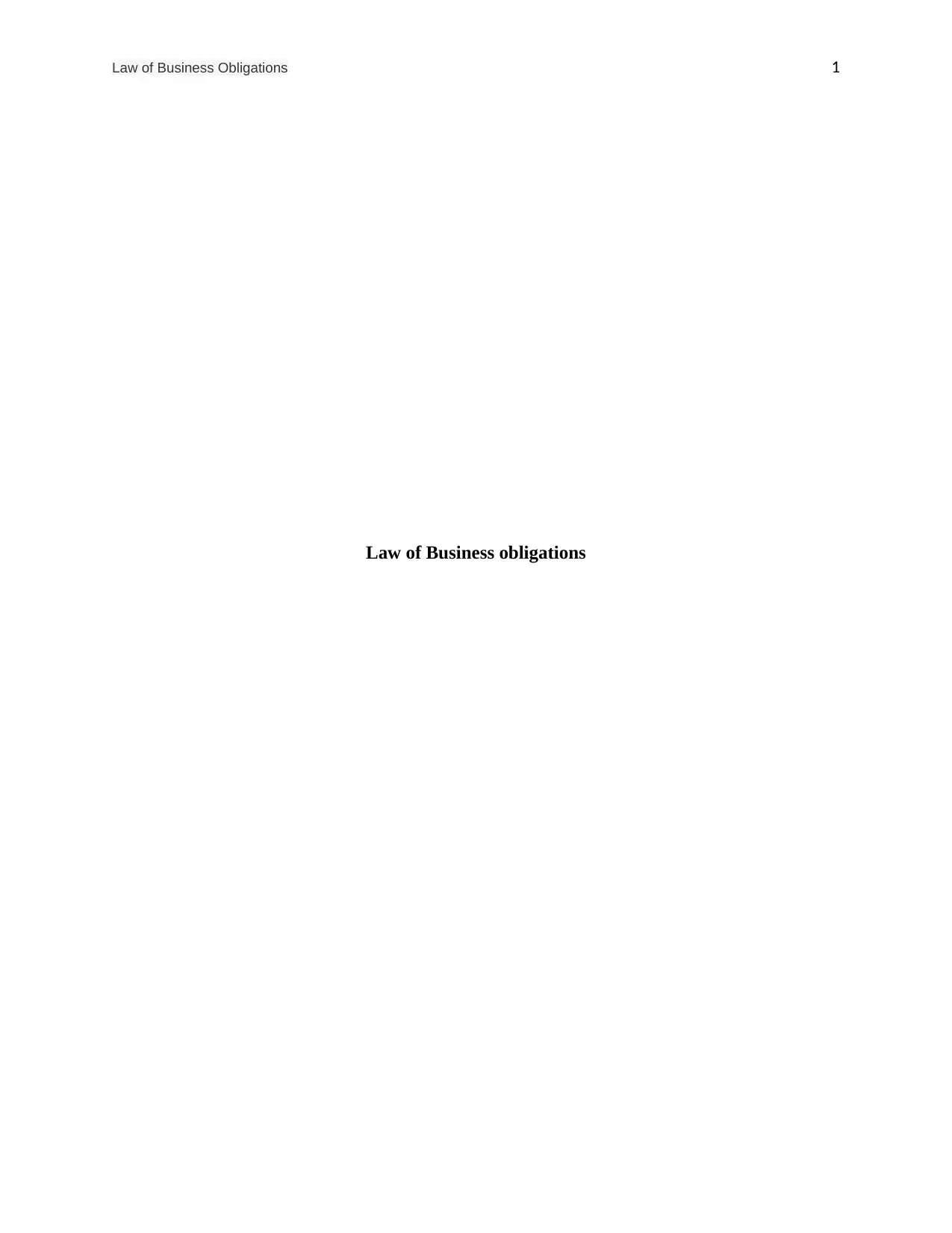
Law of Business Obligations 1
Law of Business obligations
Law of Business obligations
Paraphrase This Document
Need a fresh take? Get an instant paraphrase of this document with our AI Paraphraser
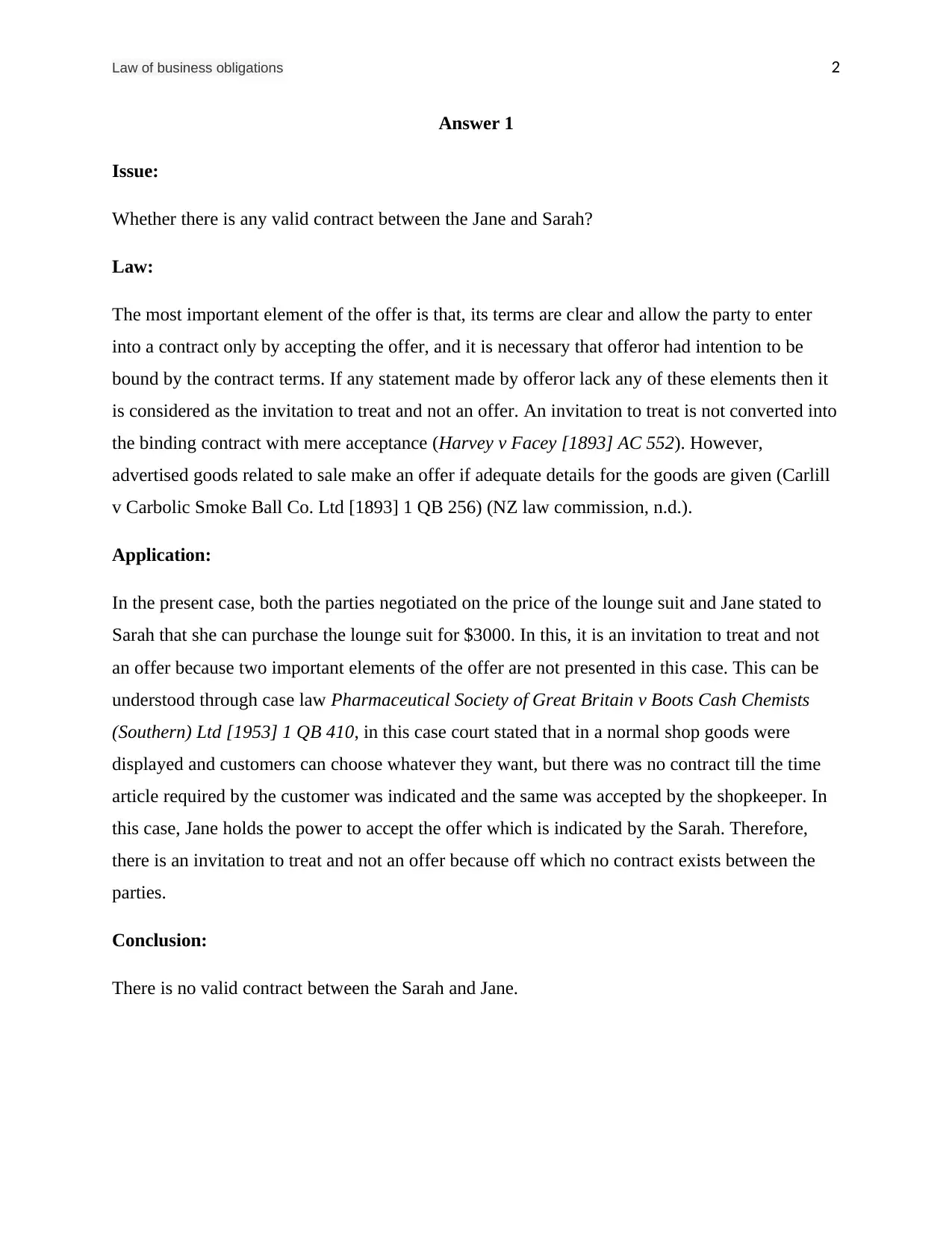
Law of business obligations 2
Answer 1
Issue:
Whether there is any valid contract between the Jane and Sarah?
Law:
The most important element of the offer is that, its terms are clear and allow the party to enter
into a contract only by accepting the offer, and it is necessary that offeror had intention to be
bound by the contract terms. If any statement made by offeror lack any of these elements then it
is considered as the invitation to treat and not an offer. An invitation to treat is not converted into
the binding contract with mere acceptance (Harvey v Facey [1893] AC 552). However,
advertised goods related to sale make an offer if adequate details for the goods are given (Carlill
v Carbolic Smoke Ball Co. Ltd [1893] 1 QB 256) (NZ law commission, n.d.).
Application:
In the present case, both the parties negotiated on the price of the lounge suit and Jane stated to
Sarah that she can purchase the lounge suit for $3000. In this, it is an invitation to treat and not
an offer because two important elements of the offer are not presented in this case. This can be
understood through case law Pharmaceutical Society of Great Britain v Boots Cash Chemists
(Southern) Ltd [1953] 1 QB 410, in this case court stated that in a normal shop goods were
displayed and customers can choose whatever they want, but there was no contract till the time
article required by the customer was indicated and the same was accepted by the shopkeeper. In
this case, Jane holds the power to accept the offer which is indicated by the Sarah. Therefore,
there is an invitation to treat and not an offer because off which no contract exists between the
parties.
Conclusion:
There is no valid contract between the Sarah and Jane.
Answer 1
Issue:
Whether there is any valid contract between the Jane and Sarah?
Law:
The most important element of the offer is that, its terms are clear and allow the party to enter
into a contract only by accepting the offer, and it is necessary that offeror had intention to be
bound by the contract terms. If any statement made by offeror lack any of these elements then it
is considered as the invitation to treat and not an offer. An invitation to treat is not converted into
the binding contract with mere acceptance (Harvey v Facey [1893] AC 552). However,
advertised goods related to sale make an offer if adequate details for the goods are given (Carlill
v Carbolic Smoke Ball Co. Ltd [1893] 1 QB 256) (NZ law commission, n.d.).
Application:
In the present case, both the parties negotiated on the price of the lounge suit and Jane stated to
Sarah that she can purchase the lounge suit for $3000. In this, it is an invitation to treat and not
an offer because two important elements of the offer are not presented in this case. This can be
understood through case law Pharmaceutical Society of Great Britain v Boots Cash Chemists
(Southern) Ltd [1953] 1 QB 410, in this case court stated that in a normal shop goods were
displayed and customers can choose whatever they want, but there was no contract till the time
article required by the customer was indicated and the same was accepted by the shopkeeper. In
this case, Jane holds the power to accept the offer which is indicated by the Sarah. Therefore,
there is an invitation to treat and not an offer because off which no contract exists between the
parties.
Conclusion:
There is no valid contract between the Sarah and Jane.
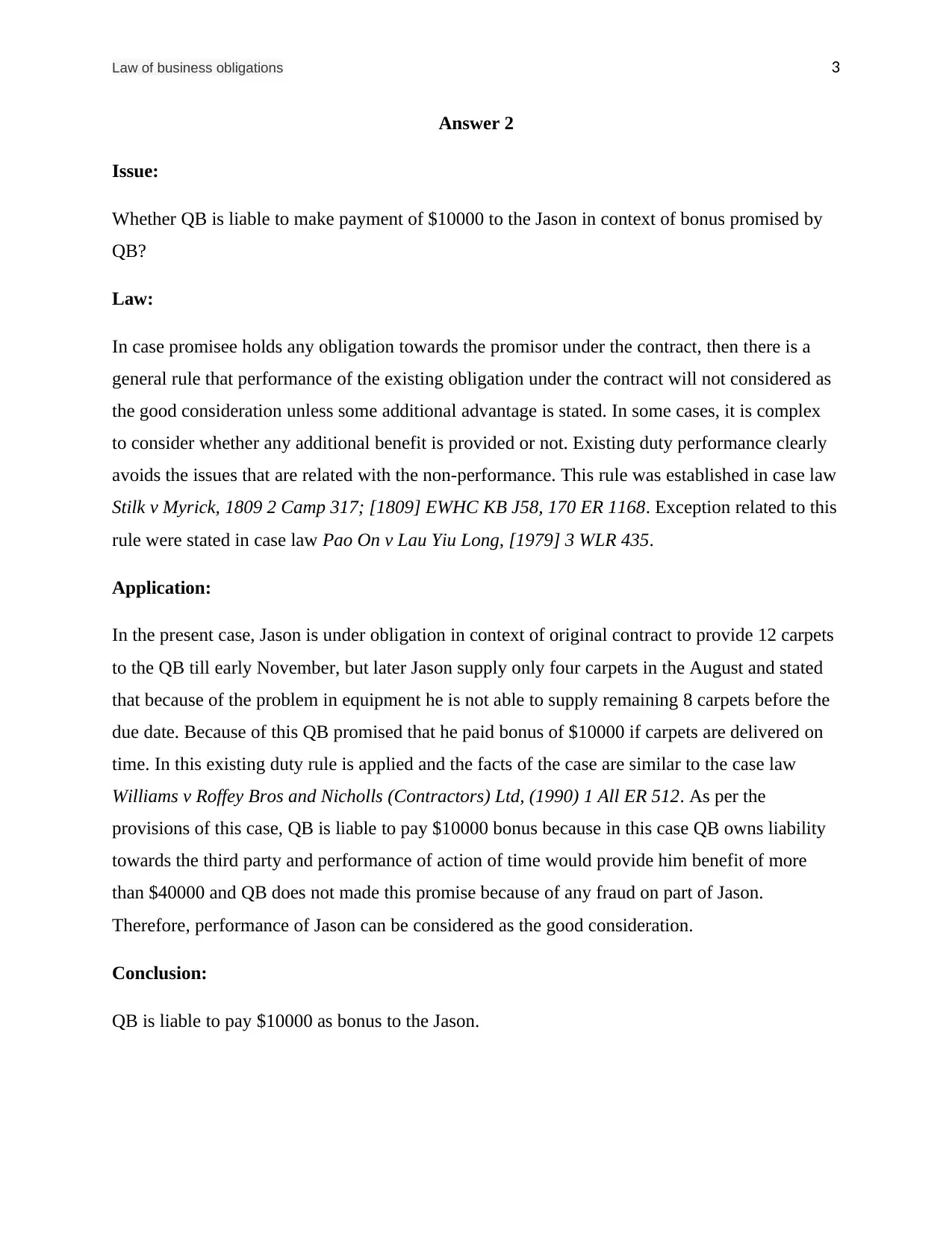
Law of business obligations 3
Answer 2
Issue:
Whether QB is liable to make payment of $10000 to the Jason in context of bonus promised by
QB?
Law:
In case promisee holds any obligation towards the promisor under the contract, then there is a
general rule that performance of the existing obligation under the contract will not considered as
the good consideration unless some additional advantage is stated. In some cases, it is complex
to consider whether any additional benefit is provided or not. Existing duty performance clearly
avoids the issues that are related with the non-performance. This rule was established in case law
Stilk v Myrick, 1809 2 Camp 317; [1809] EWHC KB J58, 170 ER 1168. Exception related to this
rule were stated in case law Pao On v Lau Yiu Long, [1979] 3 WLR 435.
Application:
In the present case, Jason is under obligation in context of original contract to provide 12 carpets
to the QB till early November, but later Jason supply only four carpets in the August and stated
that because of the problem in equipment he is not able to supply remaining 8 carpets before the
due date. Because of this QB promised that he paid bonus of $10000 if carpets are delivered on
time. In this existing duty rule is applied and the facts of the case are similar to the case law
Williams v Roffey Bros and Nicholls (Contractors) Ltd, (1990) 1 All ER 512. As per the
provisions of this case, QB is liable to pay $10000 bonus because in this case QB owns liability
towards the third party and performance of action of time would provide him benefit of more
than $40000 and QB does not made this promise because of any fraud on part of Jason.
Therefore, performance of Jason can be considered as the good consideration.
Conclusion:
QB is liable to pay $10000 as bonus to the Jason.
Answer 2
Issue:
Whether QB is liable to make payment of $10000 to the Jason in context of bonus promised by
QB?
Law:
In case promisee holds any obligation towards the promisor under the contract, then there is a
general rule that performance of the existing obligation under the contract will not considered as
the good consideration unless some additional advantage is stated. In some cases, it is complex
to consider whether any additional benefit is provided or not. Existing duty performance clearly
avoids the issues that are related with the non-performance. This rule was established in case law
Stilk v Myrick, 1809 2 Camp 317; [1809] EWHC KB J58, 170 ER 1168. Exception related to this
rule were stated in case law Pao On v Lau Yiu Long, [1979] 3 WLR 435.
Application:
In the present case, Jason is under obligation in context of original contract to provide 12 carpets
to the QB till early November, but later Jason supply only four carpets in the August and stated
that because of the problem in equipment he is not able to supply remaining 8 carpets before the
due date. Because of this QB promised that he paid bonus of $10000 if carpets are delivered on
time. In this existing duty rule is applied and the facts of the case are similar to the case law
Williams v Roffey Bros and Nicholls (Contractors) Ltd, (1990) 1 All ER 512. As per the
provisions of this case, QB is liable to pay $10000 bonus because in this case QB owns liability
towards the third party and performance of action of time would provide him benefit of more
than $40000 and QB does not made this promise because of any fraud on part of Jason.
Therefore, performance of Jason can be considered as the good consideration.
Conclusion:
QB is liable to pay $10000 as bonus to the Jason.
⊘ This is a preview!⊘
Do you want full access?
Subscribe today to unlock all pages.

Trusted by 1+ million students worldwide
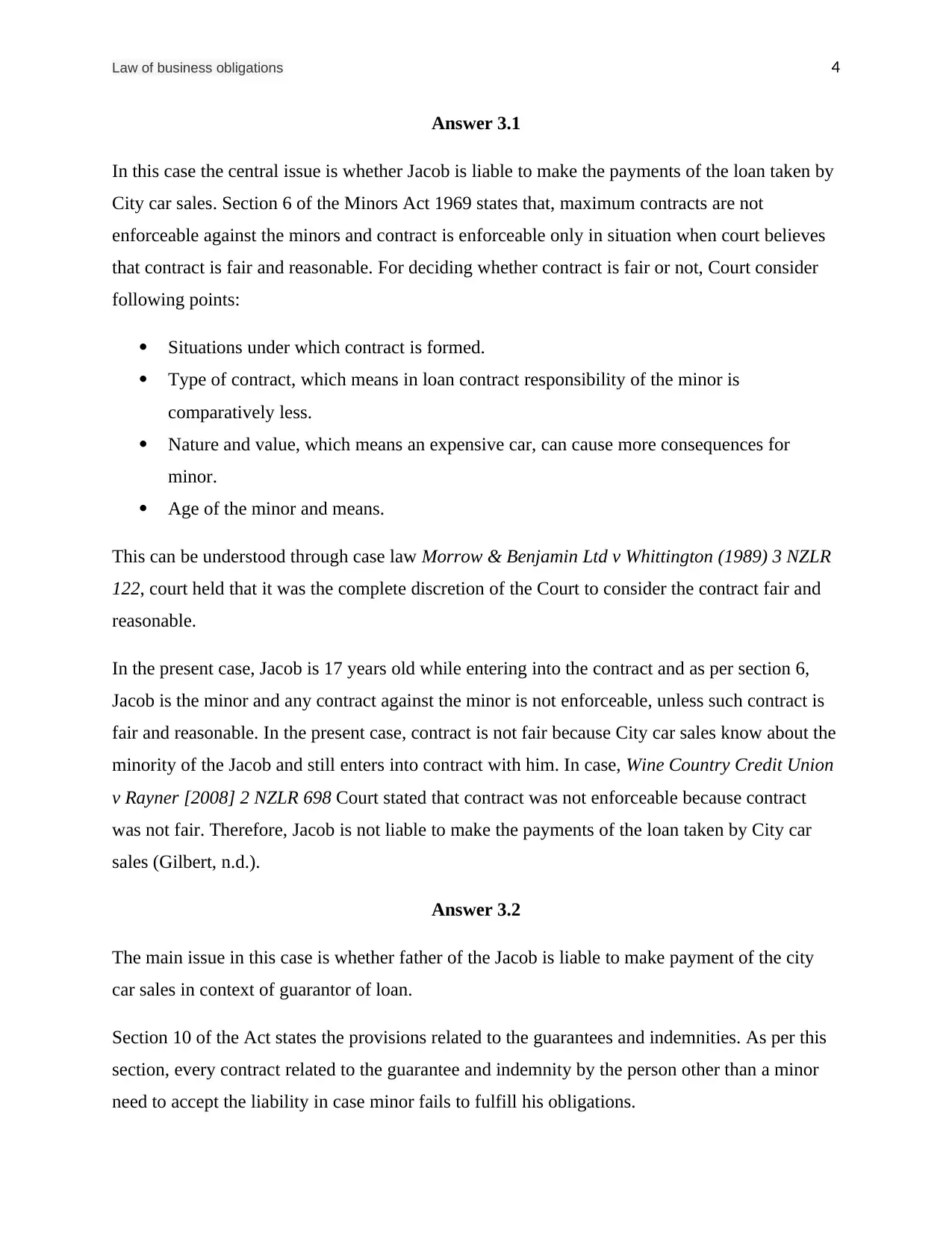
Law of business obligations 4
Answer 3.1
In this case the central issue is whether Jacob is liable to make the payments of the loan taken by
City car sales. Section 6 of the Minors Act 1969 states that, maximum contracts are not
enforceable against the minors and contract is enforceable only in situation when court believes
that contract is fair and reasonable. For deciding whether contract is fair or not, Court consider
following points:
Situations under which contract is formed.
Type of contract, which means in loan contract responsibility of the minor is
comparatively less.
Nature and value, which means an expensive car, can cause more consequences for
minor.
Age of the minor and means.
This can be understood through case law Morrow & Benjamin Ltd v Whittington (1989) 3 NZLR
122, court held that it was the complete discretion of the Court to consider the contract fair and
reasonable.
In the present case, Jacob is 17 years old while entering into the contract and as per section 6,
Jacob is the minor and any contract against the minor is not enforceable, unless such contract is
fair and reasonable. In the present case, contract is not fair because City car sales know about the
minority of the Jacob and still enters into contract with him. In case, Wine Country Credit Union
v Rayner [2008] 2 NZLR 698 Court stated that contract was not enforceable because contract
was not fair. Therefore, Jacob is not liable to make the payments of the loan taken by City car
sales (Gilbert, n.d.).
Answer 3.2
The main issue in this case is whether father of the Jacob is liable to make payment of the city
car sales in context of guarantor of loan.
Section 10 of the Act states the provisions related to the guarantees and indemnities. As per this
section, every contract related to the guarantee and indemnity by the person other than a minor
need to accept the liability in case minor fails to fulfill his obligations.
Answer 3.1
In this case the central issue is whether Jacob is liable to make the payments of the loan taken by
City car sales. Section 6 of the Minors Act 1969 states that, maximum contracts are not
enforceable against the minors and contract is enforceable only in situation when court believes
that contract is fair and reasonable. For deciding whether contract is fair or not, Court consider
following points:
Situations under which contract is formed.
Type of contract, which means in loan contract responsibility of the minor is
comparatively less.
Nature and value, which means an expensive car, can cause more consequences for
minor.
Age of the minor and means.
This can be understood through case law Morrow & Benjamin Ltd v Whittington (1989) 3 NZLR
122, court held that it was the complete discretion of the Court to consider the contract fair and
reasonable.
In the present case, Jacob is 17 years old while entering into the contract and as per section 6,
Jacob is the minor and any contract against the minor is not enforceable, unless such contract is
fair and reasonable. In the present case, contract is not fair because City car sales know about the
minority of the Jacob and still enters into contract with him. In case, Wine Country Credit Union
v Rayner [2008] 2 NZLR 698 Court stated that contract was not enforceable because contract
was not fair. Therefore, Jacob is not liable to make the payments of the loan taken by City car
sales (Gilbert, n.d.).
Answer 3.2
The main issue in this case is whether father of the Jacob is liable to make payment of the city
car sales in context of guarantor of loan.
Section 10 of the Act states the provisions related to the guarantees and indemnities. As per this
section, every contract related to the guarantee and indemnity by the person other than a minor
need to accept the liability in case minor fails to fulfill his obligations.
Paraphrase This Document
Need a fresh take? Get an instant paraphrase of this document with our AI Paraphraser
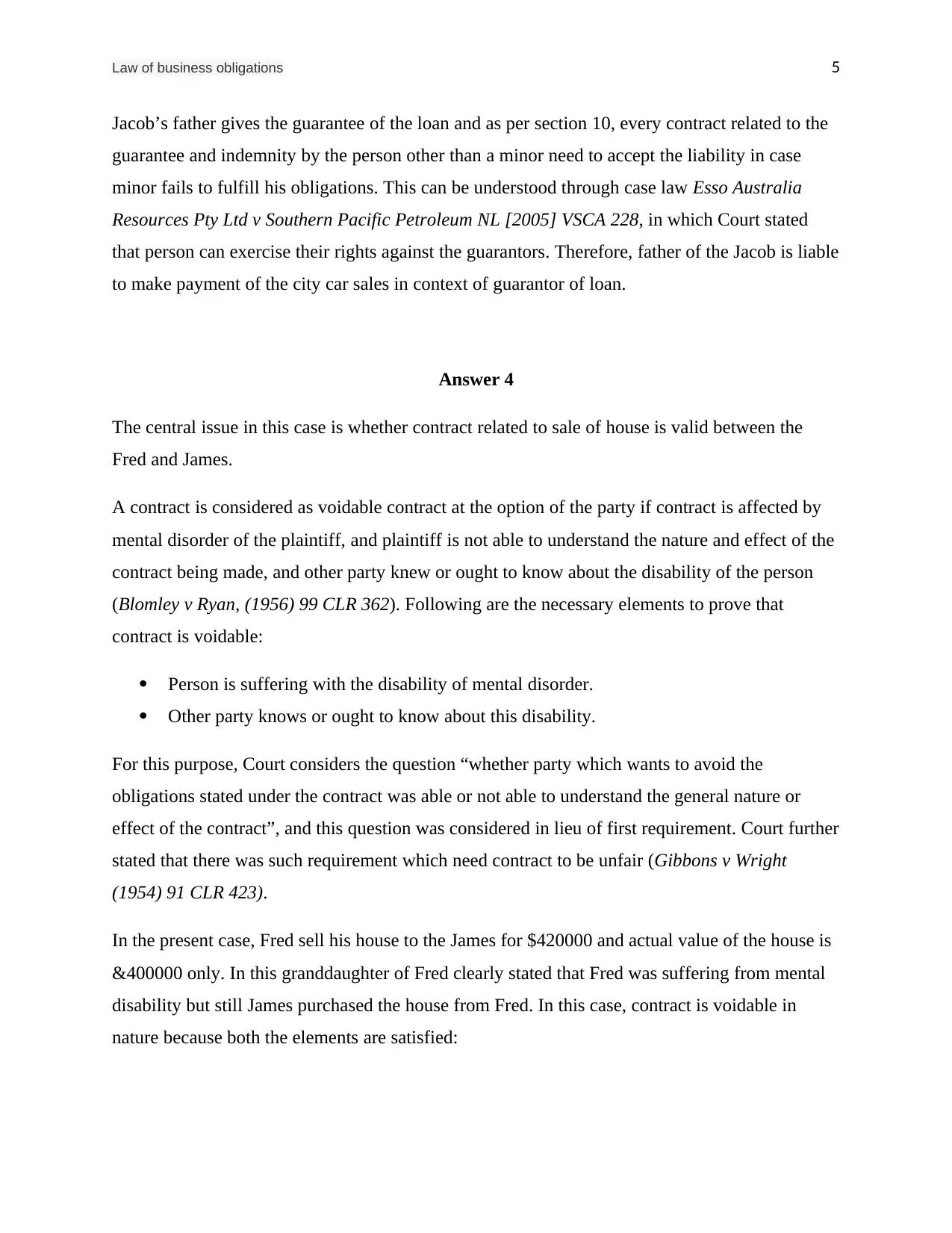
Law of business obligations 5
Jacob’s father gives the guarantee of the loan and as per section 10, every contract related to the
guarantee and indemnity by the person other than a minor need to accept the liability in case
minor fails to fulfill his obligations. This can be understood through case law Esso Australia
Resources Pty Ltd v Southern Pacific Petroleum NL [2005] VSCA 228, in which Court stated
that person can exercise their rights against the guarantors. Therefore, father of the Jacob is liable
to make payment of the city car sales in context of guarantor of loan.
Answer 4
The central issue in this case is whether contract related to sale of house is valid between the
Fred and James.
A contract is considered as voidable contract at the option of the party if contract is affected by
mental disorder of the plaintiff, and plaintiff is not able to understand the nature and effect of the
contract being made, and other party knew or ought to know about the disability of the person
(Blomley v Ryan, (1956) 99 CLR 362). Following are the necessary elements to prove that
contract is voidable:
Person is suffering with the disability of mental disorder.
Other party knows or ought to know about this disability.
For this purpose, Court considers the question “whether party which wants to avoid the
obligations stated under the contract was able or not able to understand the general nature or
effect of the contract”, and this question was considered in lieu of first requirement. Court further
stated that there was such requirement which need contract to be unfair (Gibbons v Wright
(1954) 91 CLR 423).
In the present case, Fred sell his house to the James for $420000 and actual value of the house is
&400000 only. In this granddaughter of Fred clearly stated that Fred was suffering from mental
disability but still James purchased the house from Fred. In this case, contract is voidable in
nature because both the elements are satisfied:
Jacob’s father gives the guarantee of the loan and as per section 10, every contract related to the
guarantee and indemnity by the person other than a minor need to accept the liability in case
minor fails to fulfill his obligations. This can be understood through case law Esso Australia
Resources Pty Ltd v Southern Pacific Petroleum NL [2005] VSCA 228, in which Court stated
that person can exercise their rights against the guarantors. Therefore, father of the Jacob is liable
to make payment of the city car sales in context of guarantor of loan.
Answer 4
The central issue in this case is whether contract related to sale of house is valid between the
Fred and James.
A contract is considered as voidable contract at the option of the party if contract is affected by
mental disorder of the plaintiff, and plaintiff is not able to understand the nature and effect of the
contract being made, and other party knew or ought to know about the disability of the person
(Blomley v Ryan, (1956) 99 CLR 362). Following are the necessary elements to prove that
contract is voidable:
Person is suffering with the disability of mental disorder.
Other party knows or ought to know about this disability.
For this purpose, Court considers the question “whether party which wants to avoid the
obligations stated under the contract was able or not able to understand the general nature or
effect of the contract”, and this question was considered in lieu of first requirement. Court further
stated that there was such requirement which need contract to be unfair (Gibbons v Wright
(1954) 91 CLR 423).
In the present case, Fred sell his house to the James for $420000 and actual value of the house is
&400000 only. In this granddaughter of Fred clearly stated that Fred was suffering from mental
disability but still James purchased the house from Fred. In this case, contract is voidable in
nature because both the elements are satisfied:
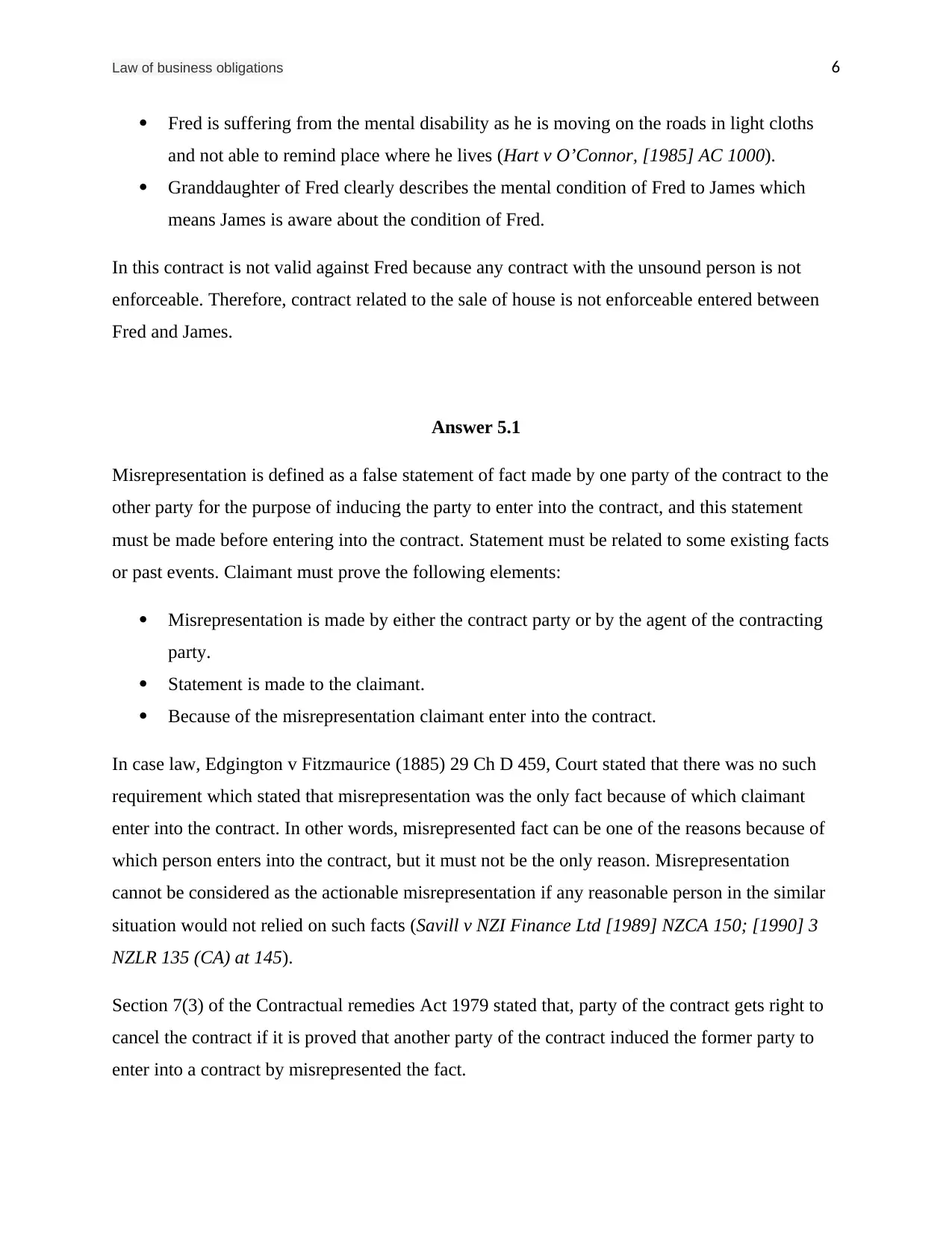
Law of business obligations 6
Fred is suffering from the mental disability as he is moving on the roads in light cloths
and not able to remind place where he lives (Hart v O’Connor, [1985] AC 1000).
Granddaughter of Fred clearly describes the mental condition of Fred to James which
means James is aware about the condition of Fred.
In this contract is not valid against Fred because any contract with the unsound person is not
enforceable. Therefore, contract related to the sale of house is not enforceable entered between
Fred and James.
Answer 5.1
Misrepresentation is defined as a false statement of fact made by one party of the contract to the
other party for the purpose of inducing the party to enter into the contract, and this statement
must be made before entering into the contract. Statement must be related to some existing facts
or past events. Claimant must prove the following elements:
Misrepresentation is made by either the contract party or by the agent of the contracting
party.
Statement is made to the claimant.
Because of the misrepresentation claimant enter into the contract.
In case law, Edgington v Fitzmaurice (1885) 29 Ch D 459, Court stated that there was no such
requirement which stated that misrepresentation was the only fact because of which claimant
enter into the contract. In other words, misrepresented fact can be one of the reasons because of
which person enters into the contract, but it must not be the only reason. Misrepresentation
cannot be considered as the actionable misrepresentation if any reasonable person in the similar
situation would not relied on such facts (Savill v NZI Finance Ltd [1989] NZCA 150; [1990] 3
NZLR 135 (CA) at 145).
Section 7(3) of the Contractual remedies Act 1979 stated that, party of the contract gets right to
cancel the contract if it is proved that another party of the contract induced the former party to
enter into a contract by misrepresented the fact.
Fred is suffering from the mental disability as he is moving on the roads in light cloths
and not able to remind place where he lives (Hart v O’Connor, [1985] AC 1000).
Granddaughter of Fred clearly describes the mental condition of Fred to James which
means James is aware about the condition of Fred.
In this contract is not valid against Fred because any contract with the unsound person is not
enforceable. Therefore, contract related to the sale of house is not enforceable entered between
Fred and James.
Answer 5.1
Misrepresentation is defined as a false statement of fact made by one party of the contract to the
other party for the purpose of inducing the party to enter into the contract, and this statement
must be made before entering into the contract. Statement must be related to some existing facts
or past events. Claimant must prove the following elements:
Misrepresentation is made by either the contract party or by the agent of the contracting
party.
Statement is made to the claimant.
Because of the misrepresentation claimant enter into the contract.
In case law, Edgington v Fitzmaurice (1885) 29 Ch D 459, Court stated that there was no such
requirement which stated that misrepresentation was the only fact because of which claimant
enter into the contract. In other words, misrepresented fact can be one of the reasons because of
which person enters into the contract, but it must not be the only reason. Misrepresentation
cannot be considered as the actionable misrepresentation if any reasonable person in the similar
situation would not relied on such facts (Savill v NZI Finance Ltd [1989] NZCA 150; [1990] 3
NZLR 135 (CA) at 145).
Section 7(3) of the Contractual remedies Act 1979 stated that, party of the contract gets right to
cancel the contract if it is proved that another party of the contract induced the former party to
enter into a contract by misrepresented the fact.
⊘ This is a preview!⊘
Do you want full access?
Subscribe today to unlock all pages.

Trusted by 1+ million students worldwide
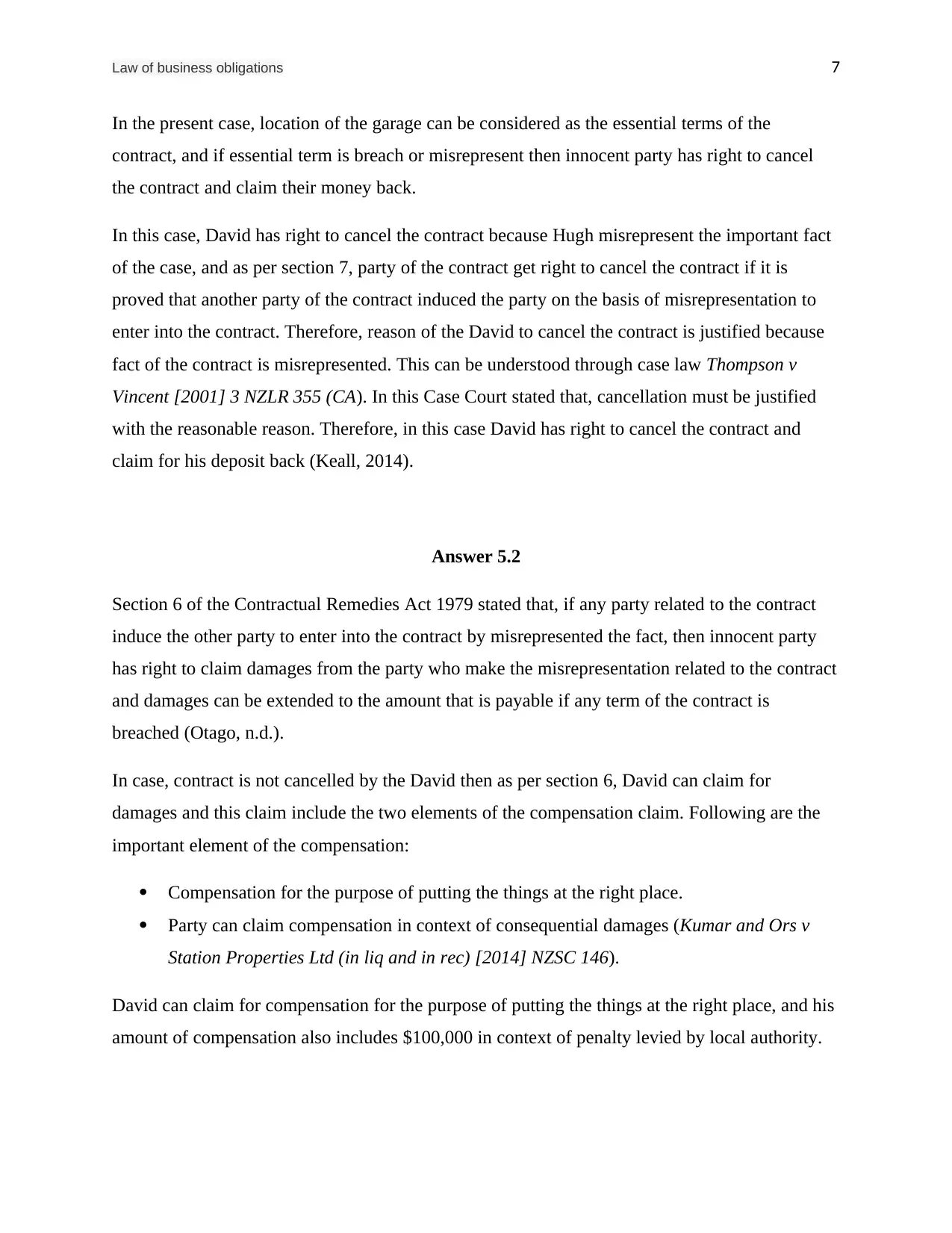
Law of business obligations 7
In the present case, location of the garage can be considered as the essential terms of the
contract, and if essential term is breach or misrepresent then innocent party has right to cancel
the contract and claim their money back.
In this case, David has right to cancel the contract because Hugh misrepresent the important fact
of the case, and as per section 7, party of the contract get right to cancel the contract if it is
proved that another party of the contract induced the party on the basis of misrepresentation to
enter into the contract. Therefore, reason of the David to cancel the contract is justified because
fact of the contract is misrepresented. This can be understood through case law Thompson v
Vincent [2001] 3 NZLR 355 (CA). In this Case Court stated that, cancellation must be justified
with the reasonable reason. Therefore, in this case David has right to cancel the contract and
claim for his deposit back (Keall, 2014).
Answer 5.2
Section 6 of the Contractual Remedies Act 1979 stated that, if any party related to the contract
induce the other party to enter into the contract by misrepresented the fact, then innocent party
has right to claim damages from the party who make the misrepresentation related to the contract
and damages can be extended to the amount that is payable if any term of the contract is
breached (Otago, n.d.).
In case, contract is not cancelled by the David then as per section 6, David can claim for
damages and this claim include the two elements of the compensation claim. Following are the
important element of the compensation:
Compensation for the purpose of putting the things at the right place.
Party can claim compensation in context of consequential damages (Kumar and Ors v
Station Properties Ltd (in liq and in rec) [2014] NZSC 146).
David can claim for compensation for the purpose of putting the things at the right place, and his
amount of compensation also includes $100,000 in context of penalty levied by local authority.
In the present case, location of the garage can be considered as the essential terms of the
contract, and if essential term is breach or misrepresent then innocent party has right to cancel
the contract and claim their money back.
In this case, David has right to cancel the contract because Hugh misrepresent the important fact
of the case, and as per section 7, party of the contract get right to cancel the contract if it is
proved that another party of the contract induced the party on the basis of misrepresentation to
enter into the contract. Therefore, reason of the David to cancel the contract is justified because
fact of the contract is misrepresented. This can be understood through case law Thompson v
Vincent [2001] 3 NZLR 355 (CA). In this Case Court stated that, cancellation must be justified
with the reasonable reason. Therefore, in this case David has right to cancel the contract and
claim for his deposit back (Keall, 2014).
Answer 5.2
Section 6 of the Contractual Remedies Act 1979 stated that, if any party related to the contract
induce the other party to enter into the contract by misrepresented the fact, then innocent party
has right to claim damages from the party who make the misrepresentation related to the contract
and damages can be extended to the amount that is payable if any term of the contract is
breached (Otago, n.d.).
In case, contract is not cancelled by the David then as per section 6, David can claim for
damages and this claim include the two elements of the compensation claim. Following are the
important element of the compensation:
Compensation for the purpose of putting the things at the right place.
Party can claim compensation in context of consequential damages (Kumar and Ors v
Station Properties Ltd (in liq and in rec) [2014] NZSC 146).
David can claim for compensation for the purpose of putting the things at the right place, and his
amount of compensation also includes $100,000 in context of penalty levied by local authority.
Paraphrase This Document
Need a fresh take? Get an instant paraphrase of this document with our AI Paraphraser
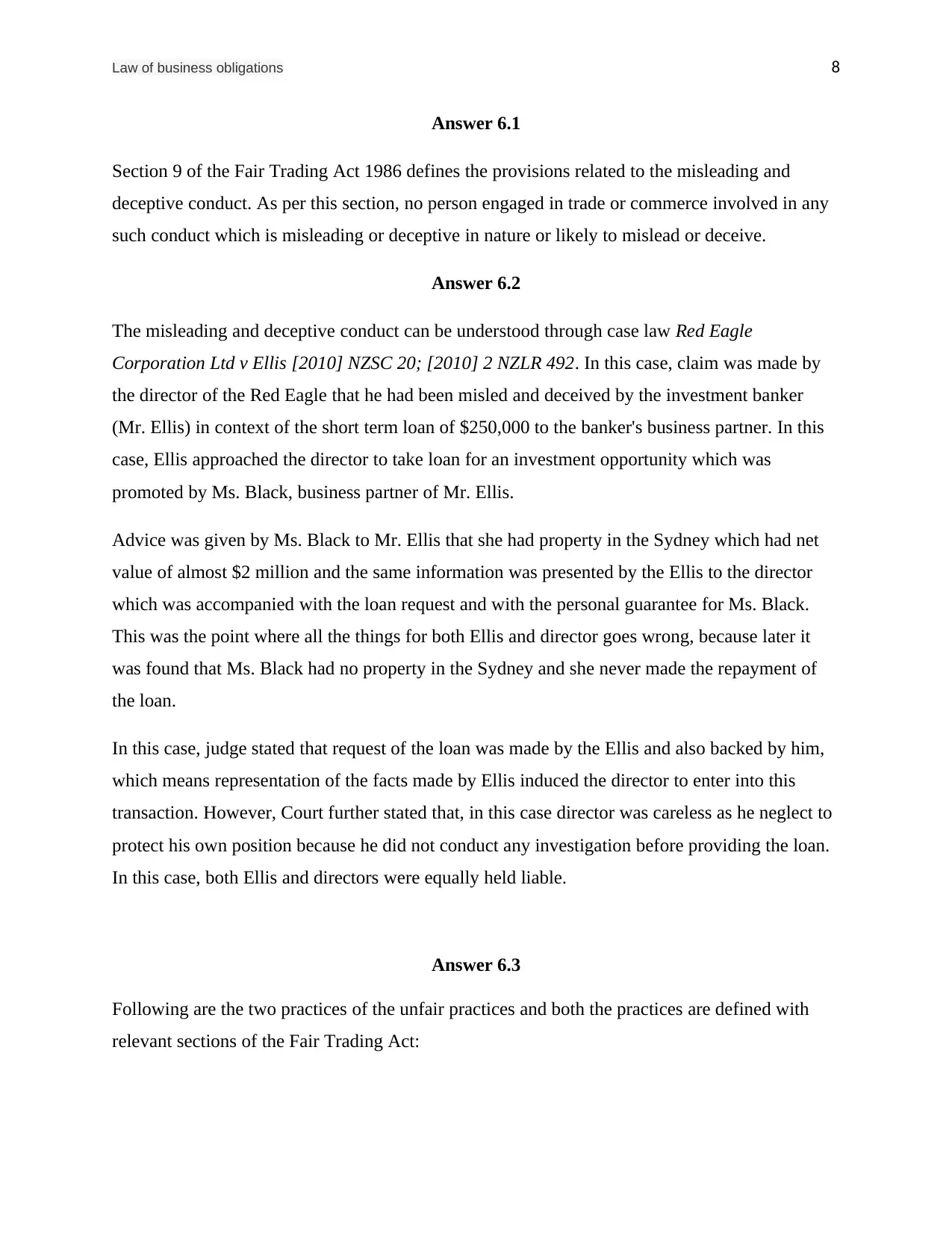
Law of business obligations 8
Answer 6.1
Section 9 of the Fair Trading Act 1986 defines the provisions related to the misleading and
deceptive conduct. As per this section, no person engaged in trade or commerce involved in any
such conduct which is misleading or deceptive in nature or likely to mislead or deceive.
Answer 6.2
The misleading and deceptive conduct can be understood through case law Red Eagle
Corporation Ltd v Ellis [2010] NZSC 20; [2010] 2 NZLR 492. In this case, claim was made by
the director of the Red Eagle that he had been misled and deceived by the investment banker
(Mr. Ellis) in context of the short term loan of $250,000 to the banker's business partner. In this
case, Ellis approached the director to take loan for an investment opportunity which was
promoted by Ms. Black, business partner of Mr. Ellis.
Advice was given by Ms. Black to Mr. Ellis that she had property in the Sydney which had net
value of almost $2 million and the same information was presented by the Ellis to the director
which was accompanied with the loan request and with the personal guarantee for Ms. Black.
This was the point where all the things for both Ellis and director goes wrong, because later it
was found that Ms. Black had no property in the Sydney and she never made the repayment of
the loan.
In this case, judge stated that request of the loan was made by the Ellis and also backed by him,
which means representation of the facts made by Ellis induced the director to enter into this
transaction. However, Court further stated that, in this case director was careless as he neglect to
protect his own position because he did not conduct any investigation before providing the loan.
In this case, both Ellis and directors were equally held liable.
Answer 6.3
Following are the two practices of the unfair practices and both the practices are defined with
relevant sections of the Fair Trading Act:
Answer 6.1
Section 9 of the Fair Trading Act 1986 defines the provisions related to the misleading and
deceptive conduct. As per this section, no person engaged in trade or commerce involved in any
such conduct which is misleading or deceptive in nature or likely to mislead or deceive.
Answer 6.2
The misleading and deceptive conduct can be understood through case law Red Eagle
Corporation Ltd v Ellis [2010] NZSC 20; [2010] 2 NZLR 492. In this case, claim was made by
the director of the Red Eagle that he had been misled and deceived by the investment banker
(Mr. Ellis) in context of the short term loan of $250,000 to the banker's business partner. In this
case, Ellis approached the director to take loan for an investment opportunity which was
promoted by Ms. Black, business partner of Mr. Ellis.
Advice was given by Ms. Black to Mr. Ellis that she had property in the Sydney which had net
value of almost $2 million and the same information was presented by the Ellis to the director
which was accompanied with the loan request and with the personal guarantee for Ms. Black.
This was the point where all the things for both Ellis and director goes wrong, because later it
was found that Ms. Black had no property in the Sydney and she never made the repayment of
the loan.
In this case, judge stated that request of the loan was made by the Ellis and also backed by him,
which means representation of the facts made by Ellis induced the director to enter into this
transaction. However, Court further stated that, in this case director was careless as he neglect to
protect his own position because he did not conduct any investigation before providing the loan.
In this case, both Ellis and directors were equally held liable.
Answer 6.3
Following are the two practices of the unfair practices and both the practices are defined with
relevant sections of the Fair Trading Act:
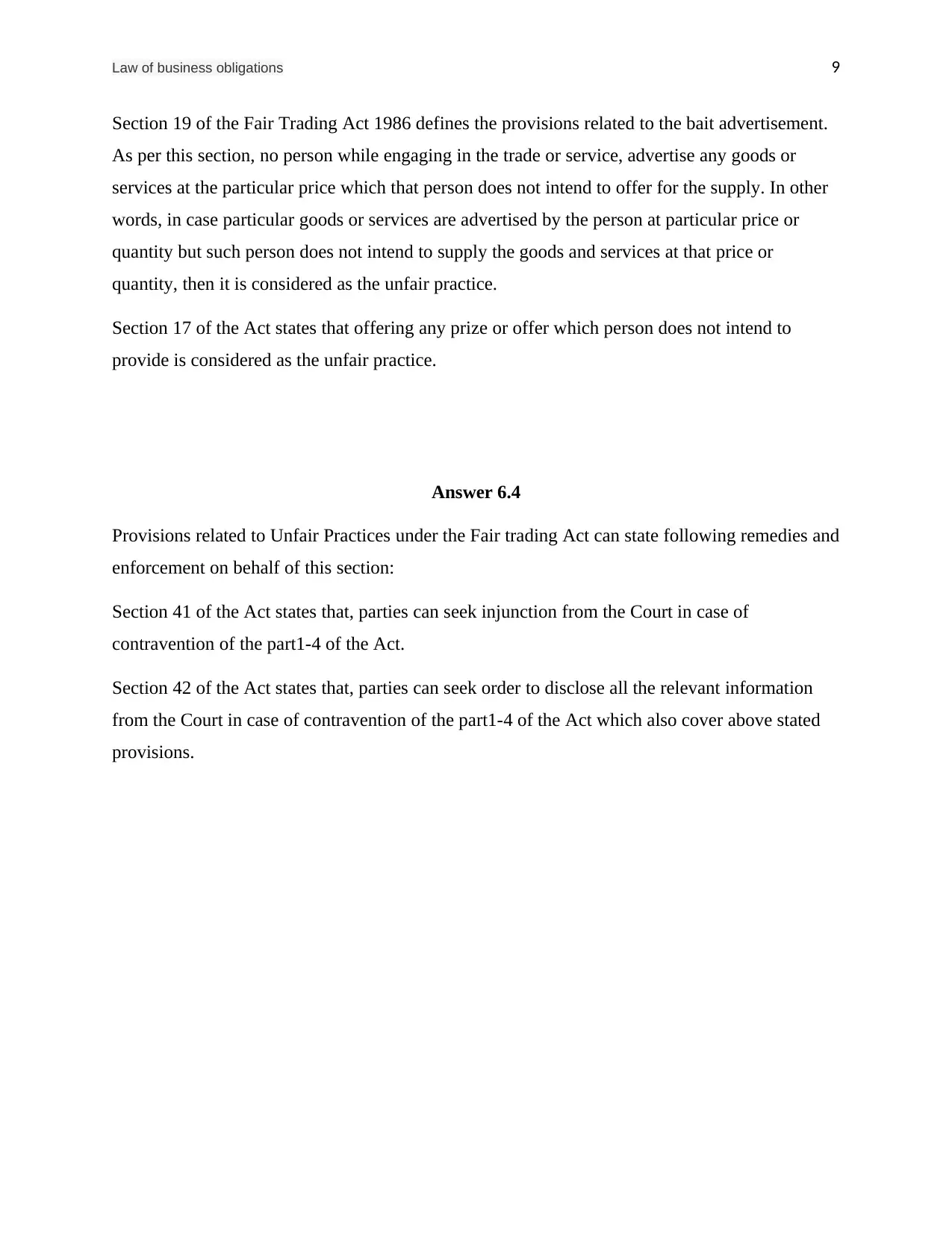
Law of business obligations 9
Section 19 of the Fair Trading Act 1986 defines the provisions related to the bait advertisement.
As per this section, no person while engaging in the trade or service, advertise any goods or
services at the particular price which that person does not intend to offer for the supply. In other
words, in case particular goods or services are advertised by the person at particular price or
quantity but such person does not intend to supply the goods and services at that price or
quantity, then it is considered as the unfair practice.
Section 17 of the Act states that offering any prize or offer which person does not intend to
provide is considered as the unfair practice.
Answer 6.4
Provisions related to Unfair Practices under the Fair trading Act can state following remedies and
enforcement on behalf of this section:
Section 41 of the Act states that, parties can seek injunction from the Court in case of
contravention of the part1-4 of the Act.
Section 42 of the Act states that, parties can seek order to disclose all the relevant information
from the Court in case of contravention of the part1-4 of the Act which also cover above stated
provisions.
Section 19 of the Fair Trading Act 1986 defines the provisions related to the bait advertisement.
As per this section, no person while engaging in the trade or service, advertise any goods or
services at the particular price which that person does not intend to offer for the supply. In other
words, in case particular goods or services are advertised by the person at particular price or
quantity but such person does not intend to supply the goods and services at that price or
quantity, then it is considered as the unfair practice.
Section 17 of the Act states that offering any prize or offer which person does not intend to
provide is considered as the unfair practice.
Answer 6.4
Provisions related to Unfair Practices under the Fair trading Act can state following remedies and
enforcement on behalf of this section:
Section 41 of the Act states that, parties can seek injunction from the Court in case of
contravention of the part1-4 of the Act.
Section 42 of the Act states that, parties can seek order to disclose all the relevant information
from the Court in case of contravention of the part1-4 of the Act which also cover above stated
provisions.
⊘ This is a preview!⊘
Do you want full access?
Subscribe today to unlock all pages.

Trusted by 1+ million students worldwide
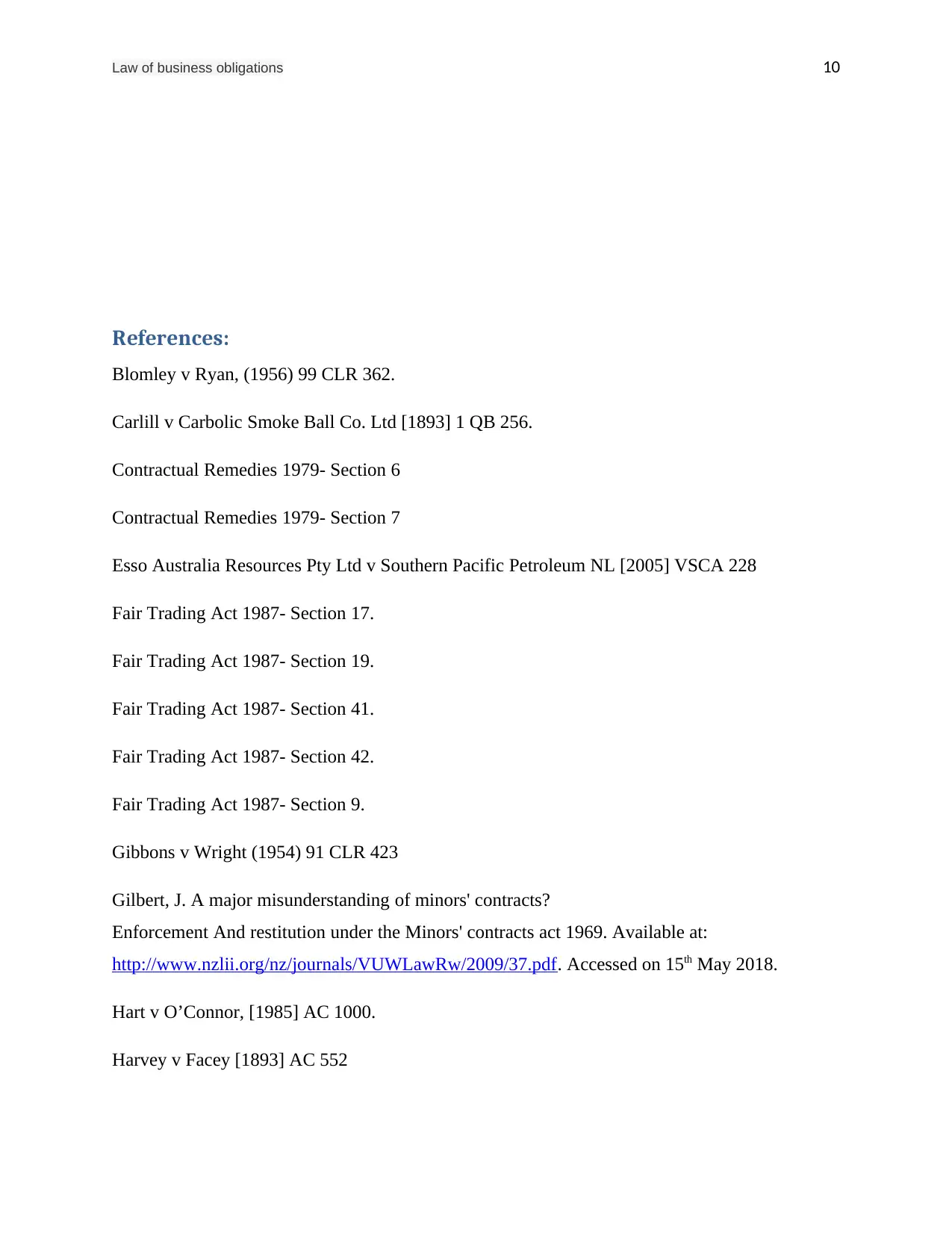
Law of business obligations 10
References:
Blomley v Ryan, (1956) 99 CLR 362.
Carlill v Carbolic Smoke Ball Co. Ltd [1893] 1 QB 256.
Contractual Remedies 1979- Section 6
Contractual Remedies 1979- Section 7
Esso Australia Resources Pty Ltd v Southern Pacific Petroleum NL [2005] VSCA 228
Fair Trading Act 1987- Section 17.
Fair Trading Act 1987- Section 19.
Fair Trading Act 1987- Section 41.
Fair Trading Act 1987- Section 42.
Fair Trading Act 1987- Section 9.
Gibbons v Wright (1954) 91 CLR 423
Gilbert, J. A major misunderstanding of minors' contracts?
Enforcement And restitution under the Minors' contracts act 1969. Available at:
http://www.nzlii.org/nz/journals/VUWLawRw/2009/37.pdf. Accessed on 15th May 2018.
Hart v O’Connor, [1985] AC 1000.
Harvey v Facey [1893] AC 552
References:
Blomley v Ryan, (1956) 99 CLR 362.
Carlill v Carbolic Smoke Ball Co. Ltd [1893] 1 QB 256.
Contractual Remedies 1979- Section 6
Contractual Remedies 1979- Section 7
Esso Australia Resources Pty Ltd v Southern Pacific Petroleum NL [2005] VSCA 228
Fair Trading Act 1987- Section 17.
Fair Trading Act 1987- Section 19.
Fair Trading Act 1987- Section 41.
Fair Trading Act 1987- Section 42.
Fair Trading Act 1987- Section 9.
Gibbons v Wright (1954) 91 CLR 423
Gilbert, J. A major misunderstanding of minors' contracts?
Enforcement And restitution under the Minors' contracts act 1969. Available at:
http://www.nzlii.org/nz/journals/VUWLawRw/2009/37.pdf. Accessed on 15th May 2018.
Hart v O’Connor, [1985] AC 1000.
Harvey v Facey [1893] AC 552
Paraphrase This Document
Need a fresh take? Get an instant paraphrase of this document with our AI Paraphraser
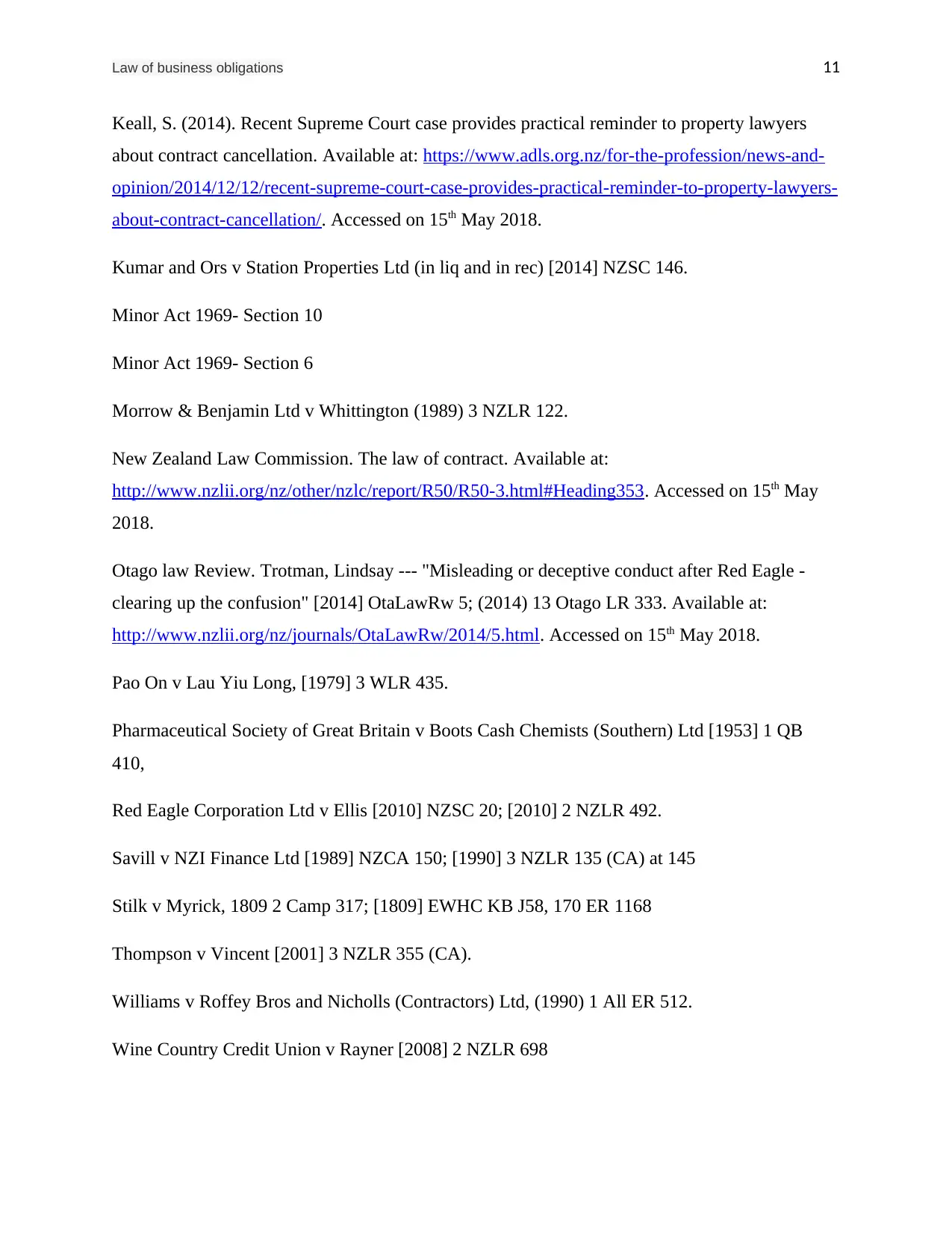
Law of business obligations 11
Keall, S. (2014). Recent Supreme Court case provides practical reminder to property lawyers
about contract cancellation. Available at: https://www.adls.org.nz/for-the-profession/news-and-
opinion/2014/12/12/recent-supreme-court-case-provides-practical-reminder-to-property-lawyers-
about-contract-cancellation/. Accessed on 15th May 2018.
Kumar and Ors v Station Properties Ltd (in liq and in rec) [2014] NZSC 146.
Minor Act 1969- Section 10
Minor Act 1969- Section 6
Morrow & Benjamin Ltd v Whittington (1989) 3 NZLR 122.
New Zealand Law Commission. The law of contract. Available at:
http://www.nzlii.org/nz/other/nzlc/report/R50/R50-3.html#Heading353. Accessed on 15th May
2018.
Otago law Review. Trotman, Lindsay --- "Misleading or deceptive conduct after Red Eagle -
clearing up the confusion" [2014] OtaLawRw 5; (2014) 13 Otago LR 333. Available at:
http://www.nzlii.org/nz/journals/OtaLawRw/2014/5.html. Accessed on 15th May 2018.
Pao On v Lau Yiu Long, [1979] 3 WLR 435.
Pharmaceutical Society of Great Britain v Boots Cash Chemists (Southern) Ltd [1953] 1 QB
410,
Red Eagle Corporation Ltd v Ellis [2010] NZSC 20; [2010] 2 NZLR 492.
Savill v NZI Finance Ltd [1989] NZCA 150; [1990] 3 NZLR 135 (CA) at 145
Stilk v Myrick, 1809 2 Camp 317; [1809] EWHC KB J58, 170 ER 1168
Thompson v Vincent [2001] 3 NZLR 355 (CA).
Williams v Roffey Bros and Nicholls (Contractors) Ltd, (1990) 1 All ER 512.
Wine Country Credit Union v Rayner [2008] 2 NZLR 698
Keall, S. (2014). Recent Supreme Court case provides practical reminder to property lawyers
about contract cancellation. Available at: https://www.adls.org.nz/for-the-profession/news-and-
opinion/2014/12/12/recent-supreme-court-case-provides-practical-reminder-to-property-lawyers-
about-contract-cancellation/. Accessed on 15th May 2018.
Kumar and Ors v Station Properties Ltd (in liq and in rec) [2014] NZSC 146.
Minor Act 1969- Section 10
Minor Act 1969- Section 6
Morrow & Benjamin Ltd v Whittington (1989) 3 NZLR 122.
New Zealand Law Commission. The law of contract. Available at:
http://www.nzlii.org/nz/other/nzlc/report/R50/R50-3.html#Heading353. Accessed on 15th May
2018.
Otago law Review. Trotman, Lindsay --- "Misleading or deceptive conduct after Red Eagle -
clearing up the confusion" [2014] OtaLawRw 5; (2014) 13 Otago LR 333. Available at:
http://www.nzlii.org/nz/journals/OtaLawRw/2014/5.html. Accessed on 15th May 2018.
Pao On v Lau Yiu Long, [1979] 3 WLR 435.
Pharmaceutical Society of Great Britain v Boots Cash Chemists (Southern) Ltd [1953] 1 QB
410,
Red Eagle Corporation Ltd v Ellis [2010] NZSC 20; [2010] 2 NZLR 492.
Savill v NZI Finance Ltd [1989] NZCA 150; [1990] 3 NZLR 135 (CA) at 145
Stilk v Myrick, 1809 2 Camp 317; [1809] EWHC KB J58, 170 ER 1168
Thompson v Vincent [2001] 3 NZLR 355 (CA).
Williams v Roffey Bros and Nicholls (Contractors) Ltd, (1990) 1 All ER 512.
Wine Country Credit Union v Rayner [2008] 2 NZLR 698

Law of business obligations 12
⊘ This is a preview!⊘
Do you want full access?
Subscribe today to unlock all pages.

Trusted by 1+ million students worldwide
1 out of 12
Related Documents
Your All-in-One AI-Powered Toolkit for Academic Success.
+13062052269
info@desklib.com
Available 24*7 on WhatsApp / Email
![[object Object]](/_next/static/media/star-bottom.7253800d.svg)
Unlock your academic potential
Copyright © 2020–2026 A2Z Services. All Rights Reserved. Developed and managed by ZUCOL.





